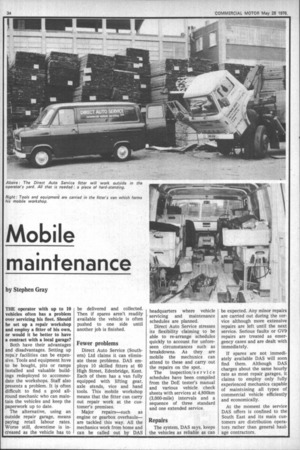Mobile maintenance
Page 36

If you've noticed an error in this article please click here to report it so we can fix it.
by Stephen Gray
THE operator with up to 10 vehicles often has a problem over servicing his fleet. Should he set up a repair workshop and employ a fitter of his own, or would it be better to have a contract with a local garage?
Both have their advantages and disadvantages. Setting up repa'r facilities can be expensive. Tools and equipment have to be bought, pits or ramps installed and valuable buildings redeployed to accommodate the workshops. Staff also presents a problem. It is often difficult to find a good allround mechanic who can maintain the vehicles and keep the paperwork up to date.
The alternative, using an outside repair garage, means paying retail labour rates. Worse still, downtime is increased as the vehicle has to be delivered and collected. Then if spares aren't readily available the vehicle is often pushed to one side until another job is finished.
Fewer problems
Direct Auto Service (Southern) Ltd claims it can eliminate these problems. DAS employs 10 skilled fitters at 60 High Street, Edenbridge, Kent. Each of them has a van fully equipped with lifting gear, axle stands, vice and hand tools. This mobile workshop means that the fitter can carry out repair work at the customer's premises.
Major repairs—such as engine or gearbox overhauls— are tackled this way. All the mechanics work from home and can be called out by DAS headquarters where vehicle servicing and maintenance schedules are planned.
Direct Auto Service stresses its flexibility claiming to be able to re-arrange schedules quickly to account for unforeseen circumstances such as breakdowns. As they are mobile the mechanics can attend to these and carry out the repairs on the spot.
The inspection/s e r vice schedules have been compiled from the DoE tester's manual and various vehicle check sheets with services at 4,800km (3,000-mile) intervals and a sequence of three standard and one extended service.
Repairs
The system, DAS says, keeps the vehicles as reliable as can be expected. Any minor repairs are carried out during the service although more extensive repairs are left until the next service. Serious faults or GV9 repairs are treated as emergency cases and are dealt with immediately.
If spares are not immediately available DAS will soon find them. Although DAS charges about the same hourly rate as most repair garages, it claims to employ only fully experienced mechanics capable of maintaining all types of commercial vehicle efficiently and economically.
At the moment the service DAS offers is confined to the South East and its main customers are distribution operators rather than general haulage contractors.




















































































